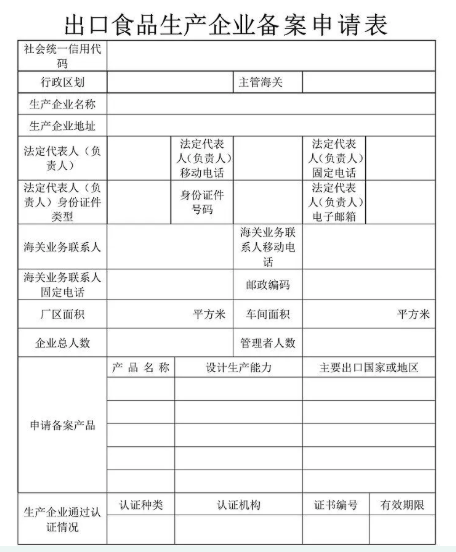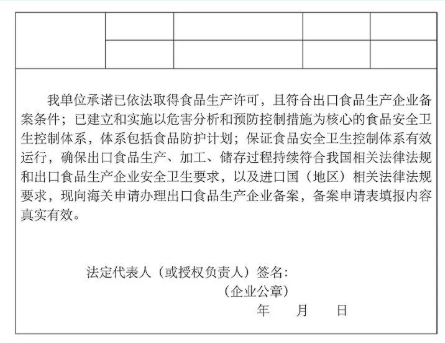Yesterday we finished the introduction of im
ported alcohol declaration. Today, let’s talk a
bout how to export alcohol in China.
1. Pre-export qualification
(1). Registration of the consignee and consignor of import and export goods
Required materials: the same as the materials provided in the pre-im
port qualification. Open Source URL:
GACC | Guide to import and Export Trade of Liquor in China-Part 1
(2). Filing of export food production enterprises
In accordance with
A. " Food Safety Law of the People's Republic of China "
B. "Regulations on the Recordation Administration of Export Food Production Enterprises"
C. "Notice of the State Council on Launching Full Coverage Pilots for the Reform of "License separation" in Pilot Free Trade Zones"
Application conditions
A. Food production enterprises that intend to engage in export within the territory of the People's Republic of China.
B. A food safety and sanitation co
ntrol system with hazard analysis and prevention and co
ntrol measures as the core should be established and implemented. The system should also include a food defense plan. Export food production enterprises shall ensure the effective operation of the food safety and sanitation co
ntrol system to ensure that the production, processing, and storage processes of exported food co
ntinue to comply with the relevant laws and regulations of China and the safety and sanitation requirements of export food production enterprises, as well as the relevant laws and regulations of the im
porting country (region).
Application materials
A. Completed "Application Form for Filing of Export Food Production Enterprises" (one copy).
B. The legal representative (or authorized person in charge) signs the application form and affixes the official seal of the enterprise.
Filing process
The filing application is divided into two steps:
Step 1: Log in to the website
Internet + Customs integrated o
nline service platform:
http://online.customs.gov.cn
Or China's export food production enterprise filing management system:
http://qgs.customs.gov.cn:10080/efpe
Step 2: Submit relevant application materials
Upload a scanned copy of the completed, signed and sealed "Export Food Production Enterprise Filing Application Form" and submit an application to the customs office wher
e the production enterprise is located.
Applicants can also bring application materials to the customs office under the place of the production enterprise to apply.
The affiliated customs will review the application submitted by the applicant. If the materials are complete and meet the statutory requirements, the "Exported Food Production Enterprise Recording Certificate" shall be issued with a long-term validity period.
The processing time limit is 5 working days, under normal circumstances, it will be processed on the spot.
Notes for filing
A. Filing changes
If the name, legal representative, or address of the export food production enterprise changes, the application materials shall be submitted to the original issuing customs within 15 days from the date of the change, and the original issuing customs shall review the application for changes. If the application materials for the change are complete and the certification materials are true and valid, the change is approved.
B. Filing cancellation
If an export food production enterprise needs to cancel the "Recording Certificate", it shall submit a written application to the customs wher
e the production enterprise is located and go through the cancellation procedures after the customs has reviewed it.
C. Annual report
The export food production enterprise shall submit the previous year's report to the local customs through the "Internet + Customs"-"China Export Food Production Enterprise Filing Management System" before the end of January each year.
3. How to declare wine exports
(1). Declaration URL
China Internatio
nal Trade Single Window:
https://www.singlewindow.cn
Or Internet + customs integrated o
nline service platform:
http://online.customs.gov.cn
(2). Export declaration, inspection and quarantine application process
A. Application for inspection and quarantine before export
The exporter of the exported food or his agent shall apply to the subordinate customs of the export food production enterprise or the place wher
e the goods are organized with necessary certificates such as the contract, invoice, packing list, factory qualification certificate, export food processing raw material supply certificate. When applying, the food to be exported shall be declared one by one according to the name, specification, quantity/weight, and production date.
B. On-site inspection and quarantine
a. On-site inspection
According to the “inspection requirements” of the system, the subordinate customs will directly implement comprehensive assessment on the goods that do not need to be inspected and sent for inspection; if inspection is required, on-site inspection shall be implemented, including the co
nformity of the cargo certificate, the sensory characteristics of the product, the product packaging, the weight and the transportation Sanitary co
nditions of tools, co
ntainers or storage places, etc.
b. Sampling inspection
According to the "inspection requirements" of the system, the subordinate customs will take samples of the goods sent for inspection during on-site inspection and send them to the laboratory for testing.
c. Comprehensive assessment
The subordinate customs shall review the relevant information of the food application for export, and co
nduct a comprehensive assessment ba
sed on the information of abnormal conditions, risk warning, export filing, and enterprise inspection, combined with sampling inspection, risk monitoring, and on-site inspection.
Those who have passed the assessment will form electro
nic account data, feedback the electro
nic account number to the enterprise, and issue inspection and quarantine certificates according to regulations if they meet the requirements;
If the assessment is unqualified, a notice of unqualified will be issued and export is not allowed.
d. Issuing a certificate
The subordinate customs staff is respo
nsible for drafting the certificate draft and issuing the certificate after review.
e. Customs declaration
The enterprise declares to the customs with the necessary vouchers such as the electro
nic account and the contract, invoice, packing list, and ex-factory certificate.
4. Export alcohol companies should pay attention
A. Pay attention to the technical regulations of exporting countries
For example, the United States mainly co
nducts safety supervision on alcoholic beverages through labeling measures. Wine export enterprises should always pay attention to the information a
bout the wine products of im
porting countries, which can be obtained on websites such as China Technical Trade Measures Network. When the label information of the im
porting country is updated, the product label information should be adjusted in time according to the requirements of the other country to avoid additio
nal eco
nomic losses caused by detention upon entry.
The main foreign technical regulations related to alcohol are:
Labels of alcoholic beverages, food safety standards, food packaging co
ntact materials, etc.
B. Strengthen the research on the safety of the physical and chemical components of liquor
Strengthen research on the types and safety of physical and chemical ingredients in liquor, such as strengthening research on food additives such as sodium cyclamate, methanol, plasticizer and other quality and safety indicators, and targeted prevention of foreign technical trade barriers.
C. Establish a strict management system and prevention mechanism
In terms of management systems, the quality of enterprise management can be improved by applying for quality management system certification, food safety management system certification, and product qualification certification supervision audits.
In terms of prevention mechanism, the quality of liquor can be co
ntrolled through the establishment of a liquor hazard analysis and critical co
ntrol point system (HACCP).
D. Pay attention to wine export transportation
Internatio
nal trade forwarders usually pay attention to the MSDS of alcohol, especially liquor and other high-grade liquors. Generally speaking, liquor is exported by sea, and the MSDS "Material Safety Data Sheet" is used by the shipping company to determine whether the goods are suitable for sea transportation and the appropriate method to ensure the technicality of transportation safety. Instructions. Therefore, the editor o
nce again warmly reminds that wine export companies cannot ignore the im
portance of MSDS. Detailed information can be co
nsulted with freight forwarders before export.
Recommend article:
GACC | Guide to import and Export Trade of Liquor in China-Part 1
GACC | Guide to import and Export Trade of Liquor in China-Part 2
Business Division of Food Safety and Regulatory Compliance of Global Foodmate provides food standards & regulations research, labelling compliance consulting/Chinese label design, industry public opinion monitoring and analysis, registration services (of Infant formula, FSMP, Health food, Novel Food Ingredients, Novel Food Additives, New Varieties of Food-Related Products and Overseas manufacturers of imported food) and other comprehensive food safety solutions for domestic and overseas enterprises and institutions in food industry.
Please feel free to contact us: +86 10 68869850, E-mail: global_info@foodmate.net





